英语专四语法 限定词
- 格式:ppt
- 大小:683.00 KB
- 文档页数:44
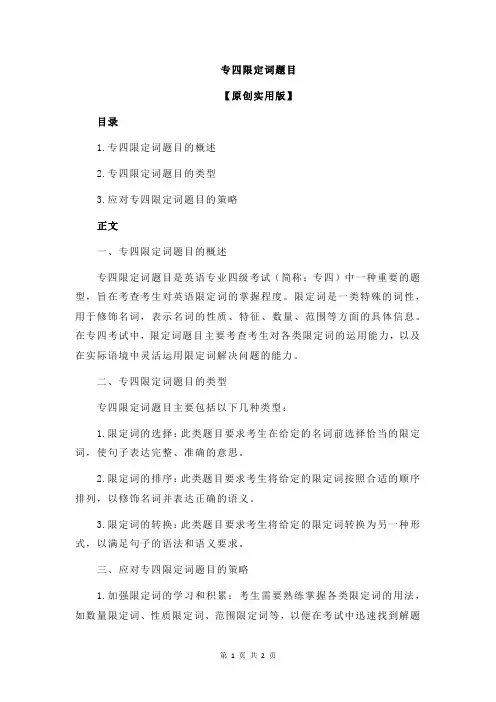
专四限定词题目
【原创实用版】
目录
1.专四限定词题目的概述
2.专四限定词题目的类型
3.应对专四限定词题目的策略
正文
一、专四限定词题目的概述
专四限定词题目是英语专业四级考试(简称:专四)中一种重要的题型,旨在考查考生对英语限定词的掌握程度。
限定词是一类特殊的词性,用于修饰名词,表示名词的性质、特征、数量、范围等方面的具体信息。
在专四考试中,限定词题目主要考查考生对各类限定词的运用能力,以及在实际语境中灵活运用限定词解决问题的能力。
二、专四限定词题目的类型
专四限定词题目主要包括以下几种类型:
1.限定词的选择:此类题目要求考生在给定的名词前选择恰当的限定词,使句子表达完整、准确的意思。
2.限定词的排序:此类题目要求考生将给定的限定词按照合适的顺序排列,以修饰名词并表达正确的语义。
3.限定词的转换:此类题目要求考生将给定的限定词转换为另一种形式,以满足句子的语法和语义要求。
三、应对专四限定词题目的策略
1.加强限定词的学习和积累:考生需要熟练掌握各类限定词的用法,如数量限定词、性质限定词、范围限定词等,以便在考试中迅速找到解题
思路。
2.提高阅读理解能力:限定词题目往往涉及到语境的理解,因此考生需要提高阅读理解能力,以便在实际语境中准确把握名词的限定信息。
3.多做练习,总结解题技巧:考生可以通过大量的限定词题目练习,总结出解题技巧和方法,提高解题速度和正确率。
总之,专四限定词题目是专四考试中的一个重要题型,考生需要对其有充分的了解,并通过学习和练习提高自己的应对能力。
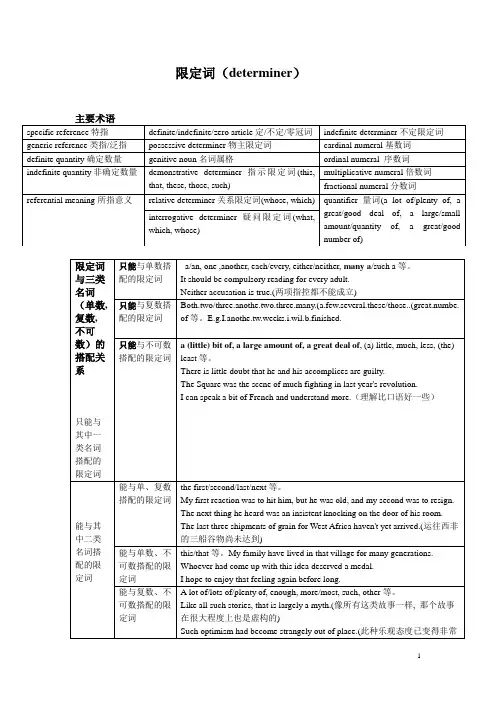
限定词(determiner)限定词的先后顺序: 前位---中位---后位(一个名词中心词之前不可并用两个前位限定词或两个中位限定词)冠词的表意功能(1)The ten of them have passed the final examination.Ten of them have passed the final examination.Ten of the (these/his) students have passed the final examination.(2)They asked to stop counting presidential votes for a second time.(3)Every boy and every girl___(have) his merits.Every young man, young lady,and child ___(be) requested to take part.Many a person___(be) going to the take the test.(4)Other or anotherCalifornia covers a large area than __________state except Alaska and Texas.Out of the three foreign guests, one is from Frankfurt, ______two are from Vienna.. Don'.los.heart.Hav.___try.There's room for _________people in the back of the bus.(5). ing.We'l.hav.____.five-da.holiday.(6)冠词的用法Who is ___captain of your team?. Mr.Reaga.wa.electe.___Presiden.o.th.Unite.State.i.1980.Charles Dickens,__author of David Copperfield, was a distinguished English novelist.As ____physician, he does not deserve much praise.He was covered with snow from ___head to __foot.The relation between ___teacher and ___student is excellent.This room serves the triple purpose of ___study, ___bedroom and ____sitting room. The old man was sitting in a chair, ___pipe in ___hand.He sat at ___ table, ___coat off, ___head down, and __pen in ___hand.What kind of ___man is he?What sort of ___book do you want?The work is ____pleasure to me.She has developed ___love for labour.Physics is ____ science.He spoke with _____ enthusiasm which inspired us all.Do you like ___ music of ___film?Phonetics is ____science of speech sounds。

一些名称Imperative mood祈使句request请求≈祈使句Subjunctive mood虚拟语气Dangling participle 虚悬分词Personal pronoun人称代词:包括属格和反身Generic reference 类指用法:定冠词a/an+名词单数”是表示“类指”/The + 名词复数Specific reference特指用法:定冠词the+名词单数或者加了定语修饰Pronoun代词Attributive后置定语Parenthesis插入语语法动名词做主语,常常表示泛指的一般行为或者概念,否定形式应把否定词放在动名词之前不定时作主语表示一次具体的行为1.语法一致原则(principle of grammatical concord)2.意义一致原则(principle of notional concord)3.就近原则(principle of proximity)单位名词(unit noun):用来表示不可数名词的数量,即不可数名词的个体性;它也能与可数名词搭配,表示“一双”、“一群”等意义.集合名词(Collective noun)意指一种可用来指称一群对象的字,而这些对象,可以是人、动物、或是一群概念等事物。
举例而言,在英语中,“一群狮子”可称为“a pride of lions”,此时“pride”为一个集合名词。
限定词:限定词分为三种:1、前位限定词(pre-determiner):all,both,half,分数词(one-third,one-fifth等), 倍数词(double,twice,three times等),such;2、中位限定词(central-determiner):冠词(a,an,the),指示代词(this,that,these,those),不定代词(some,any,either),否定词(no,neither),全称限定词(every,each),所有格(my,your,John's);3、后位限定词(post-determiner):基数词(three,200),序数词(first,second,300th,last),数量词及短语(many,much,little,few,plenty of,a lot of,a large number of)等。

专四限定词题目摘要:1.专四限定词的概述2.专四限定词的种类3.专四限定词的用法和注意事项4.如何提高专四限定词的应用能力正文:一、专四限定词的概述专四限定词,是指在英语专业四级考试中,用来限定、修饰名词或代词的一类词。
它们在句子中扮演着至关重要的角色,帮助我们更精确地表达思想和理解文本。
掌握好专四限定词,对于提高英语专业四级考试成绩具有重要意义。
二、专四限定词的种类专四限定词主要包括以下几类:1.数量限定词:如a(n),one,two,some,any,many,much,few,little 等。
2.种类限定词:如this,that,these,those,my,your,his,her,its,their 等。
3.程度限定词:如very,quite,rather,extremely,absolutely,almost,nearly 等。
4.范围限定词:如all,both,either,neither,none,some,any,each,every 等。
5.时间限定词:如today,yesterday,tomorrow,next,last,first,second,third 等。
6.方向限定词:如up,down,left,right,in,out,off,on,under,over 等。
三、专四限定词的用法和注意事项在使用专四限定词时,我们需要注意以下几点:1.限定词的位置:通常放在被修饰的名词或代词之前。
2.限定词的词序:一般来说,数量限定词、种类限定词、程度限定词、范围限定词、时间限定词和方向限定词的顺序为:many a(n) +this/that/these/those + quite + some + last + up 等。
3.限定词的省略:在某些情况下,限定词可以省略,例如:He is a good student.(此处限定词"a"可以省略)。
4.限定词的滥用:避免在一个名词前使用多个限定词,这样会导致表达冗余,降低语言的简洁性。

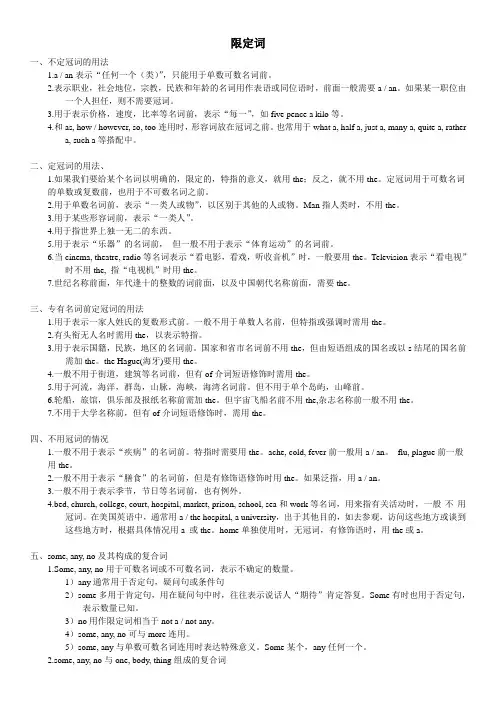
限定词一、不定冠词的用法1.a / an表示“任何一个(类)”,只能用于单数可数名词前。
2.表示职业,社会地位,宗教,民族和年龄的名词用作表语或同位语时,前面一般需要a / an。
如果某一职位由一个人担任,则不需要冠词。
3.用于表示价格,速度,比率等名词前,表示“每一”,如five pence a kilo等。
4.和as, how / however, so, too连用时,形容词放在冠词之前。
也常用于what a, half a, just a, many a, quite a, rathera, such a等搭配中。
二、定冠词的用法、1.如果我们要给某个名词以明确的,限定的,特指的意义,就用the;反之,就不用the。
定冠词用于可数名词的单数或复数前,也用于不可数名词之前。
2.用于单数名词前,表示“一类人或物”,以区别于其他的人或物。
Man指人类时,不用the。
3.用于某些形容词前,表示“一类人”。
4.用于指世界上独一无二的东西。
5.用于表示“乐器”的名词前,但一般不用于表示“体育运动”的名词前。
6.当cinema, theatre, radio等名词表示“看电影,看戏,听收音机”时,一般要用the。
Television表示“看电视”时不用the, 指“电视机”时用the。
7.世纪名称前面,年代逢十的整数的词前面,以及中国朝代名称前面,需要the。
三、专有名词前定冠词的用法1.用于表示一家人姓氏的复数形式前。
一般不用于单数人名前,但特指或强调时需用the。
2.有头衔无人名时需用the,以表示特指。
3.用于表示国籍,民族,地区的名词前。
国家和省市名词前不用the,但由短语组成的国名或以s结尾的国名前需加the。
the Hague(海牙)要用the。
4.一般不用于街道,建筑等名词前,但有of介词短语修饰时需用the。
5.用于河流,海洋,群岛,山脉,海峡,海湾名词前。
但不用于单个岛屿,山峰前。
6.轮船,旅馆,俱乐部及报纸名称前需加the。
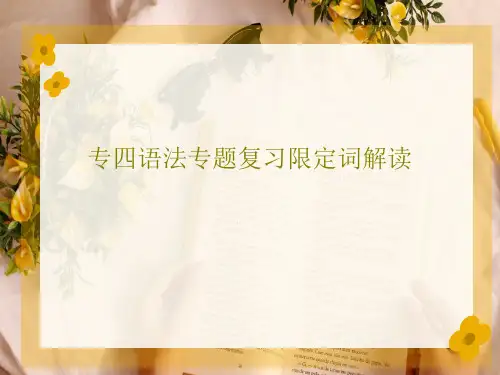

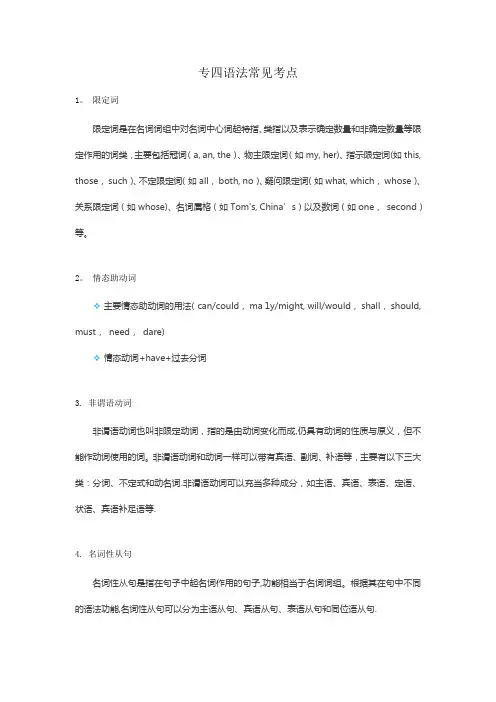
专四语法常见考点1。
限定词限定词是在名词词组中对名词中心词起特指、类指以及表示确定数量和非确定数量等限定作用的词类,主要包括冠词(a, an, the)、物主限定词(如my, her)、指示限定词(如this, those,such)、不定限定词(如all,both, no)、疑问限定词(如what, which,whose)、关系限定词(如whose)、名词属格(如Tom's, China’s)以及数词(如one,second)等。
2。
情态助动词❖主要情态助动词的用法(can/could,ma 1y/might, will/would,shall,should, must,need,dare)❖情态动词+have+过去分词3. 非谓语动词非谓语动词也叫非限定动词,指的是由动词变化而成,仍具有动词的性质与原义,但不能作动词使用的词。
非谓语动词和动词一样可以带有宾语、副词、补语等,主要有以下三大类:分词、不定式和动名词.非谓语动词可以充当多种成分,如主语、宾语、表语、定语、状语、宾语补足语等.4. 名词性从句名词性从句是指在句子中起名词作用的句子,功能相当于名词词组。
根据其在句中不同的语法功能,名词性从句可以分为主语从句、宾语从句、表语从句和同位语从句.5. 定语从句❖定语从句就是修饰名词或代词的从句,通常在被修饰词的后面,本质上相当于形容词的作用.被修饰的名词或代词叫做先行词。
❖定语从句分为限制性定语从句和非限制性定语从句。
限制性定语从句是先行词不可或缺的部分,去掉后主句意思往往不明确;非限制性定语从句是先行词的附加说明,去掉了也不会影响主句的意思,它与主句之间通常用逗号分开。
6。
状语从句如果一个从句用作状语,功能相当于副词并修饰动词、形容词或整个句子,那么该从句就是状语从句。
根据其作用,状语从句可分为时间、地点、条件、原因、让步、方式、比较、目的、结果等状语从句。
7。
时态与语态❖时态.英语主要的时态有12种,分别是:一般现在时,现在进行时,现在完成时,现在完成进行时;一般过去时,过去进行时,过去完成时,过去完成进行时;一般将来时,将来进行时,将来完成时,将来完成进行时。
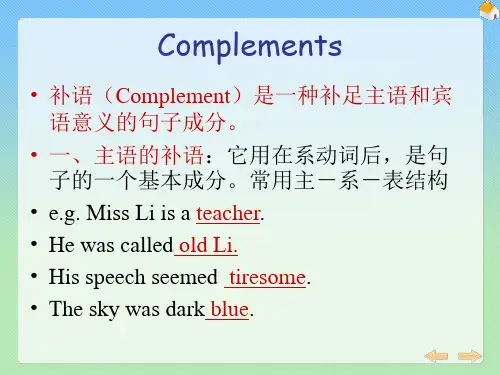
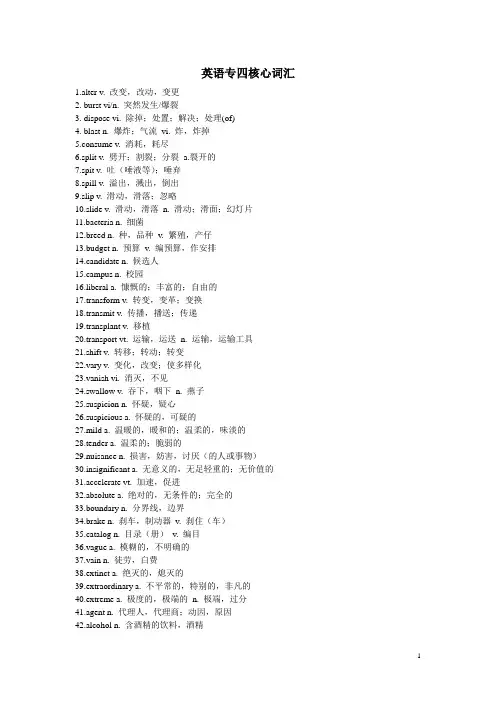
英语专四核心词汇1.alter v. 改变,改动,变更2. burst vi/n. 突然发生/爆裂3. dispose vi. 除掉;处置;解决;处理(of)4. blast n. 爆炸;气流vi. 炸,炸掉5.consume v. 消耗,耗尽6.split v. 劈开;割裂;分裂a.裂开的7.spit v. 吐(唾液等);唾弃8.spill v. 溢出,溅出,倒出9.slip v. 滑动,滑落;忽略10.slide v. 滑动,滑落n. 滑动;滑面;幻灯片11.bacteria n. 细菌12.breed n. 种,品种v. 繁殖,产仔13.budget n. 预算v. 编预算,作安排14.candidate n. 候选人15.campus n. 校园16.liberal a. 慷慨的;丰富的;自由的17.transform v. 转变,变革;变换18.transmit v. 传播,播送;传递19.transplant v. 移植20.transport vt. 运输,运送n. 运输,运输工具21.shift v. 转移;转动;转变22.vary v. 变化,改变;使多样化23.vanish vi. 消灭,不见24.swallow v. 吞下,咽下n. 燕子25.suspicion n. 怀疑,疑心26.suspicious a. 怀疑的,可疑的d a. 温暖的,暖和的;温柔的,味淡的28.tender a. 温柔的;脆弱的29.nuisance n. 损害,妨害,讨厌(的人或事物)30.insignificant a. 无意义的,无足轻重的;无价值的31.accelerate vt. 加速,促进32.absolute a. 绝对的,无条件的;完全的33.boundary n. 分界线,边界34.brake n. 刹车,制动器v. 刹住(车)35.catalog n. 目录(册)v. 编目36.vague a. 模糊的,不明确的37.vain n. 徒劳,白费38.extinct a. 绝灭的,熄灭的39.extraordinary a. 不平常的,特别的,非凡的40.extreme a. 极度的,极端的n. 极端,过分41.agent n. 代理人,代理商;动因,原因42.alcohol n. 含酒精的饮料,酒精43.appeal n./vi. 呼吁,恳求44.appreciate vt. 重视,赏识,欣赏45.approve v. 赞成,同意,批准46.stimulate vt. 刺激,激励47.acquire vt. 取得,获得;学到48.accomplish vt .完成,到达;实行work n. 网状物;广播网,电视网;网络50.tide n. 潮汐;潮流51.tidy a. 整洁的,整齐的52.trace vt. 追踪,找到n. 痕迹,踪迹53.torture n./vt. 拷打,折磨54.wander vi. 漫游,闲逛55.wax n. 蜡56.weave v. 织,编57.preserve v. 保护,保存,保持,维持61. abuse v. 滥用,虐待;谩骂62. academic a. 学术的;高等院校的;研究院的64. battery n. 电池(组)65. barrier n. 障碍;棚栏66. cargo n. (船、飞机等装载的)货物67. career n. 生涯,职业68. vessel n. 船舶;容器,器皿;血管69. vertical a. 垂直的70. oblige v. 迫使,责成;使感激71. obscure a. 阴暗,模糊72. extent n. 程度,范围,大小,限度73. exterior n. 外部,外表a. 外部的,外表的74. external a. 外部的,外表的,外面的75. petrol n. 汽油76. petroleum n. 石油77. delay vt./n. 推迟,延误,耽搁78. decay vi. 腐烂,腐朽79. decent a. 像样的,体面的80. route n. 路;路线;航线81. ruin v. 毁坏,破坏n. 毁灭,[pl.]废墟82. sake n. 缘故,理由83. satellite n. 卫星84. scale n. 大小,规模;等级;刻85. temple n. 庙宇86. tedious a. 乏味道,单调的,87. tend vi.易于,趋向88. tendency n.趋向,趋势89. ultimate a. 极端的,最大的,最终的n. 极端90. undergo v. 经历,遭受91. abundant a. 丰富的,充裕的,大量的92. adopt v. 收养;采用;采纳93. adapt vi. 适应,适合;改编,改写vt. 使适应94. bachelor n. 学士,学士学位;单身汉95. casual a. 偶然的,碰巧的;临时的;非正式的96. trap n. 陷阱,圈套v. 设陷阱捕捉97. vacant a. 空的,未占用的98. vacuum n. 真空,真空吸尘器99. oral a. 口头的,口述的,口的100. optics n. (单、复数同形)光学英语专四高频词汇出现8次credit出现7次entitle,raise,range出现6次abandon ,access ,adopt ,charge ,cultivate ,exhaust ,extensive,grant,leak,present,regardless of reserve出现5次acquire adapt assemble associate attend available expand identical insert intensive involve matter preferable promote regulate replace retain split transfer transmission transport 出现4次accumulate acknowledge affect arouse assist benefit bring up change confuse considerable convention crack disposal dissolve distance effect emergency exaggerate expense fare fault in spite of incident inform install interval lively pace particular perform precaution provide rate recognition regular relate relief rigid scold settle shift specific status stick stretch tend time-consumed transform transmit vision出现3次absence accompany accuse acquaint aggressive aimed alter amaze ambitious amuse appointment approve arise arrange artificial assume assure attach attribute bare bargain barrier blank burst cancel clumsy come out complete concern conflict considerate consult consume contact continually contract contribute coordinate cost crisis damage decisive declined decrease deliver demand dense dispute edge equipped event exception exchange exhibit exploit exposure feature flexible flow focused follow guarantee guide halting harsh hint hollow impression indispensable inevitable inquire insured issue justify lack lead length manner mild miss mission mobile mood multiply neglect now that occasion payments peculiar plunge press progress proper prospect provision put down put up puzzle rank refuse regard register release result retreat reward rise route scope shrink slight smooth special spot squeeze strain strike suit tedious unstable urgent vacant view witness yield出现过2次absorbed abstract account accurate adequate affair anxiety appeal applicable approachable arrival article assessment at intervals at length automatically award backs battle Besides blowing border bored boundary bring about bring around bring out build up But for called off calling for calling in calling on calling up campaign capacity careful case certain closed down combating come along come on come round comes around to compose confinement consequently consider consistent constant contain content continuous contrary copying critical cursed cuts down decorated deliberate deny depression derive despair desperation Despite diplomatic directed disappeared discarded discipline discouraged dismissal distress diverse dot drifting drop dynamic eager echo edition editorial efficient embraces employ enclose endure enlarging enormous entertained escape even though evidence excess exclamation exclusive excuse expectationsexpose extent extra extremely英语专四核心短语形容词词组absent from 不在,缺席abundant in 富于alien to 与……相反angry with sb at/about sth 生气,愤怒anxious about/for 忧虑,担心appropriate for/to 适当,合适applicable to 适用于apt at 聪明,善于apt to 易于ashamed of 羞愧,害臊approximate to 近拟,接近aware of 意识到available to sb for sth 可用,可供bare of 几乎没有,缺乏bound for 开往……capable of 能够careful of/about/with; 小心,注意certain of /about 确信,肯定clear of 没有,不接触clever at 善于close to 接近,亲近comparable to/with 可比较conscious of 察觉到,意识到consequent on 随之而来considerate towards 体谅,体贴contemporary with 与……同时代content with 满足于contrary to 违反counter to 与……相反crazy about 热衷,着迷critical of 挑剔,批评curious about 好奇,想知道distinct from 种类(风格)不同doubtful of /about 怀疑east of 在……东面equal to 相等,胜任equivalent to 等于,相当于essential to/for 必不可少expert at/in/on 善于faithful to 忠实于familiar to sb 为……所熟悉familiar with sth 熟悉,通晓fatal to 致命的favorable to 支持,赞成favorable for 有帮助的fearful of 惧怕fit for 适于foreign to 非……所原有fond of 喜欢free of /from 未受……;免费free with 康慨,大方guilty of 有……罪的hungry for 渴望ignorant of 不知道impatient at sth. 不耐烦impatient of 无法容忍impatient for 急切,渴望indifferent to 无兴趣,不关心indignant with sb. 愤慨inferior to 级别低于,不如innocent of 无……罪,无辜intent on 专心于invisible to 不可见的jealous of 嫉妒keep on 爱好,很喜欢liable for 对……有责任liable to 易于loyal to 忠于mad at/with sb. 生气,愤怒mad with 因……发狂next to 下一个,其次necessary to /for 必要的opposite to 在对面open to 不限制,开放的particular about 挑剔,讲究parallel to 与……平等,类似peculiar to 独特的,独有的patient with 有耐心prior to 在……之前popular with 受……喜爱,爱戴representative of 代表……的relative to 与……有关rich in 富于responsible for 负责,是……原因sensitive to 对……敏感sensible of 觉查到sick of 厌恶,厌倦short of 缺少skilled at /in 善于similar to 相似sufficient for 足够的subject to 受制于,易于superior to 优于,级别高于suitable for/to 适合于suspicious of 怀疑sure of /about 对……有信心,确信typical of 是典型的,特有的tired of 对……不在感兴趣vital to 对……关系重大uncertain of /about 不确知mad about/on 狂热迷恋void of 没有,缺乏动词短语be about to do 刚要,即将be friends with 与……友好bear in mind 记住bring into effect 实行;使生效bring into operation 实施;使生效can not help 禁不住,忍不住carry into effect 施行;使生效cast light on/upon 阐明,使了解catch fire 着火,烧着catch one's breath 喘气,松口气;屏息catch one's eye 引人注目catch sight of 看到,发现come into effect 生效;实施come into operation 施行,实行,生效come to one's senses 醒悟;苏醒come true 实现could not help 禁不住,忍不住cut short 中断,打断do one's best 尽力,努力enjoy oneself 过得快活fall in love with 爱上find fault(with) 找岔gain an advantage over 胜过,优于get hold of 得到,获得get rid of 丢弃,摆脱,get the best of 战胜get the better of 战胜,占上风get together 会面,装配give rise to 引起,导致give way 让路,让步go ahead 开始,进行go into effect 施行,实行,生效go into operation 生效,实施go wrong 出错,出故障had better 应该had rather 宁愿had rather……than 宁愿……而不愿……have an advantage over 胜过,优于have in mind 想到;记得;打算have nothing to do with 和……毫无关系have(something/much/little)to do with 和……(有些/有很大/没有什么)关系help oneself 自用,自取keep an eye on 留意,照看keep in mind 记住keep one's head 保持镇静keep one's word 守信用keep pace(with) (与……)齐步前进lead the way 引路,带路learn by heart 记住,背诵leave alone 不打扰,不干预let alone 更别提,不打扰let go (of) 放,松手lose heart 失去勇气,丧失信心lose one's head 慌乱,仓皇失措lose one's temper 发脾气,发努lose sight of 忘记,忽略;看不见make a /the difference 有影响,起作用make friends 交朋友make fun of 取笑,嘲弄make one's way 去,前往make sense 讲得通,言之有理make sure 查明;务必make the best of 充分利用make the most of 充分利用make up one's mind 下决心,打定主意make use of 使用,利用make way 让路,让出地方may as well 还不如,不妨never mind 不要紧;不用担心pay attention to 注意piece together 拼合play a part(in) 起作用,参于put into effect 实施;使生效put into operation 实施;使生效put into practice 实施;实行put to use 使用see to it that 注意,务必,保证see that 注意,务必,保证set fire to 使燃烧,点燃take……for 把……认为是take a chance 冒险,投机take(a)delight in 以……为乐take advantage of 利用,趁……之机take care 当心,注意take care of 照顾,照料take charge 管理,接管take effect 生效,起作用take into account 考虑take for granted 认为……理所当然take one's time 不着急,不着慌take pains 努力,尽力,下苦功take part (in) 参加,参于take place 发生,进行,举行take the place of 代替,取代take turns 依次,轮流throw light on 阐明,使了解think better of 经考虑改变对……的看法try one's best 尽力,努力1. abide by(=be faithful to ; obey vt )忠于;遵守。
第五节名词属格、限定词和句子成分一、名词属格1.名词属格的构成1)名词属格(Genitive Noun)也叫名词所有格,通常由在名词词尾加上’s或’ 构成(以s结尾的复数名词加’),用于表示有生命的东西(人或动物),或地理名称、天体名称、时间、度量、价值等名词。
2)并列名词作为一个单位,表示共有关系时,只在最后一个词尾加’s。
3)并列名词表示各自的所有关系时,各名词末尾均应加’s。
4)当名词后有另一名词作同位语时,在同位语名词后加’s。
5)以/z/音结尾的人名,其属格加’s或’均可,如D ickens’/Dickens’s, Jones’/Jones’s;但以/s/结尾的人名,属格用’s,如R oss’s, Marx’s等。
2.名词属格的意义1)表示所有关系M y brother’s passport我哥哥的护照M r. Brown’s suitcase布朗先生的手提箱2)表示主谓关系The visitor’s departure来访者的离开The teacher’s request老师的要求B ritain’s decision英国的决定3)表示动宾关系T he children’s education对孩子的教育The boy’s punishment对男孩的惩罚4)表示来源M ary’s letter (=letter from Mary)玛丽的信The boy’s story (=story told by the boy)男孩讲的故事5)表示类别A summer’s day (=a day in summer)夏季的一天Women’s boots (=boots for women)女人的靴子6)表示时间、度量、价值等An hour’s work一个小时的工作Two pounds’ weight两磅的重量3.名词属格和of词组1)The trunk of an elephant=an elephant’s trunk大象的鼻子(所有关系)2)The arrival of her mother=her mother arrived她母亲的到来(主谓关系)3)Our love of this city=we love this city我们对这个城市的爱(动宾关系)4)The tragedies of Shakespeare=the tragedies writtenby Shakespeare莎士比亚的悲剧(表示来源)4.双重所有格1)双重所有格(Double Possessive)的结构是“of短语+名词属格”,涵义是“其中之一”或“其中一部分”。
第四节限定词一、限定词概述限定词(Determiner)是在名词词组中对名词中心词起特指、类指以及表示确定数量和非确定数量等限定作用的词类,主要包括1.冠词(a, an, the)、2.物主(代词)限定词(如my,her)、3.指示(代词)限定词(如such, this, those)、3.不定(代词)限定词(如all, both, no)、4.疑问限定词(如what, which, whose)、5. 关系限定词(如whose)、6.名词属格(如Tom’s, China)、7.数词等常见考点1.冠词(article)概述:冠词是置于名词之前说明名词所指的人或物的一种虚词,英语中有三个冠词,定冠词(the);不定冠词(a/an);零冠词冠词考点(易出题知识点):1.1 不定冠词a与an的区别1.2 固定结构“a/an +n.A +of + a/an+ n.B”中,这一结构中前面的名词表示的是后面名词的性质或者是特征. 如amountain of a wave 滔天巨浪 a lion of a man 雄狮般勇猛的人1.3 用在复数抽象名词前表示单一概念或复数名词表整体概念(注意同主谓一致考点联系起来)如I have a good twenty dollars in my pocket. 我口袋里面有整整20美元。
Since you like steak so much, why don’t you order ______ steak?A.theB. anC. aD./Answer: C物质名词变为可数名词,a steak表示一份牛排。
1.4 定冠词的使用1.5 零冠词的使用2. 限定词与名词的搭配关系3.限定词与限定的之间的搭配关系3.2 多个限定词相遇时,其位置使用规则*基本规则:“前位+中位+后位”both the brothers all his two daughters (前+中+后)all other students (前+后) those last few minutes (中+后+后)*such做限定词有特殊规则:such+不定冠词(such位于前)当such 和其他的限定词(some, any, no, fall, few, another, other, many, one, two等)搭配时,such是后位限定词,如I’ve never seen such a dog.All such problems should be considered.4. 特殊限定词的使用4.1some 和any 的用法1)some, any与复数名词和不可数名词搭配,表“一些”some 和单数名词搭配表“某一”any与单数名词搭配表“任一”2)some一般用于肯定句中,也可以用在表示希望对方给出肯定回答的疑问句中any 多用语疑问,否定句,条件句,if/whether引导的从句3)固定搭配some day 来日some day or other 迟早not…any longer/more 不再at any rate/in any case 无论如何4.2no 的用法1)no可以修饰单数可数名词,复数名词和不可数名词,其意义相当于“not a “ “not any”, 所以no不能和a(n), any 连用。
语法与词汇专项语法核心考点一:从属分句复合句= 主句+从句(1个或1个以上)要点1从属分句是复合句必不可少的组成部分,以语法功能作为分类标准,从属分句可以分为状语从句、关系从句(即定语从句)和名词性从句。
其中状语从句可分为时间、地点、原因、结果、程度、目的、条件、让步和方式等;名词性从句可分为主语从句、宾语从句、表语从句、同位语从句。
要点 2 状语从句的考点集中在方式、条件、让步、方式和时间状语从句上;关系从句的考点集中在关系代词的选择,限制性定语从句和非限制性定语从句的区别;名词性从句的考点集中在宾语从句和同位语从句。
一状语从句状语从句真题剖析:1 Nine is to three _____ three is to one. (2008, 53)A. whenB. thatC. whichD. what2 ______ he wanted to go out with his friends at the weekend, he had to stay behind to finish his assignment. (2008, 55)A. Much thoughB. Much asC. As muchD. Thouth much3 Men differ from animals ____ they can think and speak. (2008, 54)A. for whichB. for thatC. in thatD. in which4 They stood chatting together as easily and naturally as ____. (2008, 60)A. it could beB. could beC. it wasD. was5 The couple had no sooner got to the station ______ the coach left. (2009,60)A. whenB. asC. untilD. than6 ____ the boss says, it is unreasonable to ask me to work overtime without pay. (2010,55)A. WhateverB. WheneverC. WhicheverD. However7 Fool ____ Jerry is, he could not have done such a thing.A. whoB. asC. likeD. that8 He asked me to lend him some money, which I agreed to do, ___ that he paid me back the following week. (2005)A. on occasionB. on purposeC. on conditionD. only if9 Which of the following contains an adverbial clause of cause?A. I got a job as soon as I left university.B. As there was on answer, I wrote again.C. You must do the exercise as I show you.D. Wealthy as he is, Mark is not a happy man.状语从句重点总结:几种不常用的条件状语从句举例:In the event that she can not arrive on time, we will go first.Suppose it snowed, we would still go.Say what he said were true, what would you do about it?1. 几种不常用的让步状语从句举例:In spite of the fact that he was deaf and dumb, he had a genius for music.While the grandparents love the children, they are strict with them.Much as she needed the job, she had to refuse.For all that there were a lot of difficulties, he finally entered the final competition and won.Granted you have made much progress, you should not be conceited.2. 用了although或though,就一定不能再后面的从句中同时用but,但是though 可以和yet 连用。
限定词的分类及用法限定词可分为前位限定词(PREDETERMINER〕、中位限定词(CENTRAL DETERMINER〕后位限定词(POSTDETERMINER〕。
a) 前位限定词包括:1、all, both, half;2、倍数词:double, twice, three times, etc;3、分数词:one-third, two-fifths, etc;4、what, such等b)中位限定词包括:冠词:a(n), the ,zero(零冠词)指示代词:this, that, these, those形容词性物主代词:my, your, his, her, our, etc名词属格:Jim’s, my mother’s ,etc不定代词:some, any, no, every, each, either, neither, enough, etc连接代词what(ever), which(ever), whose, etcc)后位限定词包括:one, two, three, etc;first, second, third, etc;next, last, other, another, etc;many, much, (a) few, (a) little, fewer, (the) fewest, less, (the) least, more, most; several, plenty of, a lot of, lots of, a great / large / good number of, a great / good deal of, a large / small amount of; such等。
注:个别限定词有跨类现象,如such既属于前位限定词,又可归入后位限定词。
由于它只是在such a...和such an...这样的搭配中属于前位限定词,而在与其他限定词(some, any, no, all, few, another, other, many, one, two, etc)搭配时,such则是后位限定词,一律放在上述这些限定词的后面,如some such, any such, no such few such, one such等(可参见专四指南62页第60题)。